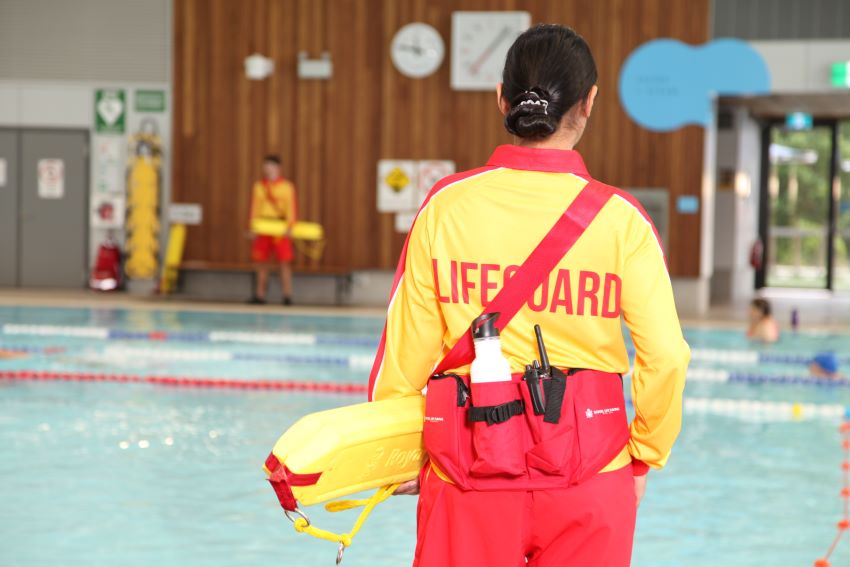Finding the right lifeguard course is essential if you’re looking to become a certified lifeguard. This training not only opens doors to employment opportunities but also equips you with lifesaving skills.

Whether you’re a high school student looking for a summer job, a college student seeking part-time work, or an adult aiming to improve your skills, finding the right course is crucial. So, how do you find the best lifeguard course near me? Let’s dive into it.
Understanding Lifeguard Training
What is Lifeguard Training?
Lifeguard training is a comprehensive program designed to teach individuals how to prevent and respond to aquatic emergencies. This training covers a wide range of skills, from basic water rescue techniques to advanced life-saving methods.
Essential Skills Learned in Lifeguard Courses
In a typical lifeguard course, you will learn:
Water rescue skills
CPR and first aid
AED (Automated External Defibrillator) usage
Swimming techniques and endurance
Emergency response and teamwork
Types of Lifeguard Courses
Basic Lifeguard Certification
The basic lifeguard certification is the entry-level course for aspiring lifeguards. It covers essential skills and knowledge required to supervise swimming areas safely.
Advanced Lifeguard Courses
For those looking to take their skills to the next level, advanced courses are available. These might include waterfront lifeguarding, waterpark lifeguarding, and other specialized areas.
Specialized Lifeguard Training
Specialized training can include courses like lifeguard instructor certification, where you learn to teach lifeguarding skills to others, or courses focusing on specific environments, such as open water lifeguarding.
Benefits of Lifeguard Certification
Employment Opportunities
One of the most significant benefits of lifeguard certification is the employment opportunities it provides. Certified lifeguards are in demand at pools, beaches, and water parks.
Lifesaving Skills
The skills you learn during lifeguard training can save lives. Whether you’re on duty or off, these skills are invaluable.
Physical Fitness
Lifeguarding is a physically demanding job, and the training will help improve your fitness levels, ensuring you’re ready to perform when needed.
American Lifeguard USA: An Overview
History and Mission
American Lifeguard USA is a leading organization dedicated to training and certifying lifeguards across the United States. Their mission is to provide comprehensive, high-quality training that equips lifeguards with the skills they need to save lives.
Course Offerings
American Lifeguard USA offers a variety of courses, from basic certification to advanced and specialized training. They are known for their rigorous standards and excellent instruction.
Finding Lifeguard Courses Near You
Using Online Resources
The internet is your best friend when searching for lifeguard courses. Websites like American Lifeguard USA offer search tools to find courses near you.
Local Community Centers and Pools
Check with local community centers, YMCAs, and public pools. They often offer lifeguard training courses, especially as summer approaches.
Colleges and Universities
Many colleges and universities offer lifeguard training as part of their recreation programs. This can be a convenient option if you’re a student.
Criteria for Choosing a Lifeguard Course
Accreditation and Certification
Ensure the course is accredited by a recognized organization like American Lifeguard USA. This ensures the certification is valid and recognized.
Instructor Qualifications
The quality of instruction is crucial. Look for courses taught by experienced, certified instructors.
Course Content and Structure
Review the course content to ensure it covers all necessary skills and knowledge comprehensively.
What to Expect in a Lifeguard Course
Classroom Training
Theoretical knowledge is crucial in lifeguard training. You’ll learn about safety protocols, first aid, and emergency response procedures.
Practical Water Skills
Hands-on practice is essential. Expect to spend a significant amount of time in the water, learning rescue techniques and swimming skills.
Exams and Assessments
To get certified, you’ll need to pass both written exams and practical assessments, demonstrating your proficiency in lifeguarding skills.
Preparing for Lifeguard Training
Physical Preparation
Lifeguard training is physically demanding. Ensure you’re in good physical shape, with strong swimming skills and endurance.
Mental Preparation
Mental preparedness is just as important. Be ready to handle stressful situations calmly and effectively.
Required Materials and Gear
Make sure you have all the necessary materials and gear, such as a swimsuit, goggles, and a whistle.
The Role of Lifeguards
Responsibilities of a Lifeguard
Lifeguards have a crucial role in maintaining safety. They monitor swimming areas, perform rescues, administer first aid, and ensure a safe environment.
Real-Life Scenarios
Training will prepare you for real-life scenarios, from minor injuries to major emergencies, ensuring you’re ready to respond effectively.
Lifeguard Certification Renewal
Importance of Renewal
Lifeguard certification needs to be renewed periodically to ensure skills and knowledge are up to date.
How to Renew Certification
Renewal typically involves a refresher course and re-assessment of skills. Check with your certifying organization for specific requirements.
Costs and Financial Aid for Lifeguard Courses
Average Costs
The cost of lifeguard courses can vary. Basic courses may cost a few hundred dollars, while specialized training can be more expensive.
Scholarships and Financial Aid Options
Some organizations offer scholarships and financial aid. Check with American Lifeguard USA and other local institutions for available options.
Success Stories from Lifeguards
Inspiring Stories from Certified Lifeguards
Hearing from those who have completed the training can be motivating. Many lifeguards have stories of saving lives and making a difference in their communities.
How Certification Changed Their Lives
Lifeguard certification can lead to personal and professional growth. Many lifeguards find that the skills they learn are applicable in various aspects of life.
Common Challenges in Lifeguard Training
Physical Demands
The training is physically challenging, requiring strength, endurance, and excellent swimming skills.
Balancing Training with Other Commitments
Many trainees juggle lifeguard training with school, work, and other responsibilities. Time management is key.
Conclusion
Becoming a certified lifeguard is a rewarding journey. It opens up job opportunities, equips you with valuable skills, and allows you to make a significant impact on your community. If you’re ready to take the plunge, start by researching lifeguard courses near you and choose one that meets your needs and goals.
